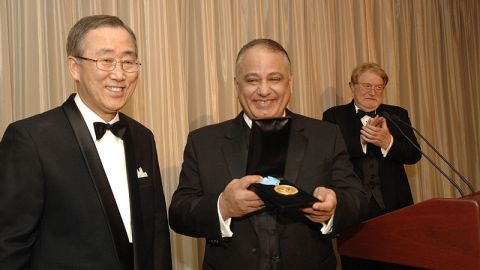The World Follows As Ban ki moon Turns The Heat On Assad

When President Bashar al Assad was elected (unopposed) in 2000, many in the West heralded this as progress. Assad’s father in law, Fahwaz – who I came to know – was a Harley Street doctor in London. Assad himself was young, metropolitan and talked of reform. It was possible to dare to hope that the brutal repression of dissent in Syrian could end. A number of Western countries, including Britain offered expertise and advice. A British Syrian Friendship Society was founded and joint conferences of businessmen were organised in Damascus. I covered some of these meetings as both a print and television journalist. I also interviewed some Syrian Government Ministers, Western analysts and followed President Assad around reporting on various speeches he made. On one occasion I travelled to Damascus to report on high level meetings between the UN Secretary General, Ban ki moon and the Syrian Government, at that time putting feelers out to Israel over a possible negotiated settlement in the occupied Golan heights.
I shared the optimism of the time, although more sage and experienced hands warned of the authoritarian grip that lay behind a seemingly well meaning President. Over recent months I have often wondered what became of that lanky, seeming well intentioned educated man, who at one point seemed poised to deliver Syrian from authoritarianism.
But the attempts to snuff our opposition at all costs, using soldiers and tanks revealed that underneath it all, the regime hadn’t changed one jot. But all of a sudden the international community didn’t seem to want to know. Syria’s traditional ally, Russia, to this day supports the Ba’athist regime, while Europe and America, were unable to demonstrate the same commitment to supporting the human rights of the Syrian people that they were showing in Libya.
For a considerable period the only real voice of moral authority, the only person to attempt to exert real pressure on the Syrian regime, was the Secretary General of the United Nations, Ban ki moon. As elsewhere in the Middle East and North Africa, Ban has been consistent and urgent. His envoys have worked around the clock, while Ban himself played a powerful role behind the scenes stiffening the resolve of the United States in particular. That there has now been an international call – with the exception of Russia – for Assad to step down, is largely the result of Ban’s intervention.
The paradox is that despite the brutality of a Ba’athist regime that has been prepared to kill perhaps two thousand or so of its own people, the regime remains secular. The fear must be, if Assad’s regime refuses the UN as honest broker, that a new Government may take a much less tolerant attitude to Syria’s minorities, particularly the Christians. Doubtless this will be weighing on the minds of Ban and his envoys as the Syrian crisis moves to its likely climax.





